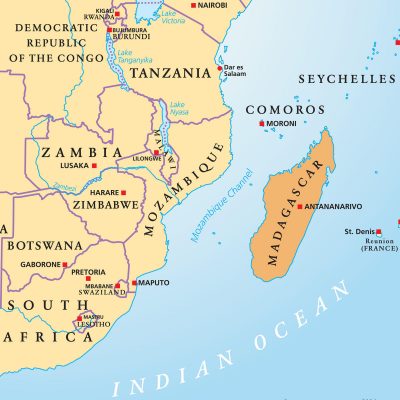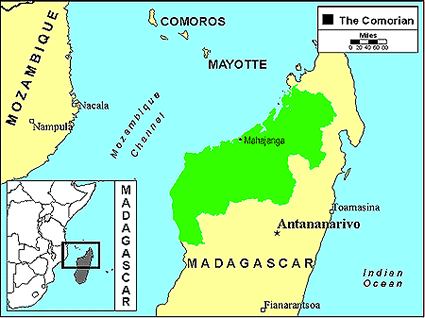Why Are French Forces in Madagascar?

In the year 1960 during the Madagascar’s independence process, it was geostrategically important for General De Gaulle to demand that Mayotte, Reunion and Scattered islands (in French Îles Éparses) be left as French soil. According to the General, it was important for French interests that France remains a military-political and commercial dominant force especially in the Mozambique Channel in Eastern Africa. On this understanding which can be called the “De Gaulle doctrine”, this is an indirect existence. Even today, the French presence around Madagascar gives the appearance of the island being under embargo.
An independence referendum was held in Comoros on 22 December 1974. The overall result was a strong “yes” vote, with 94.57% of voters voting for independence.
Mayotte in 1974, which was part of Comoros, it was decided by the UN to ban the second time French referendum. Nevertheless after the ‘manipulated’ 1976 referendum Eparses Islands accepted French domination.
Difficult to accept that decision, not recognized by Comoros shows the Eparses islands in the French government territory as “parts” of Mayotte geographically. It is important that first of all Mayotte has to clarify its legal status with the Comoros Islands, while their attachment to France is controversial in the legal sense.
Europa, Bassas da İndia and Juan de Nova particularly in Mozambique Channel, is important because it is located in strategically important regions of the middle of the channel.
Today the Eparses islands, which become a crisis between Madagascar and France and the center of the discussion, are Juan de Nova Island.
Although the number of French troops on the islands is symbolic, the airport and military troops on the island have actually turned the island into a military base. The fact that civilian entrances to the island are subject to long process and permits issued by the authorities of Reunion have made it impossible to reach the island.
The island, therefore, is home to only French soldiers and some biologists. A French Coast Guard maintains routine patrols around the island.
As is known, the International Montego Bay Convention gives the authority to control 200 nautical miles of marine resources outside the territorial waters of a country. This arrangement allowed France to control a marine area of 425,000 square kilometers, including a total of %70 of the Mozambique Channel.
The texts are ambiguous in limiting the Exclusive Economic Zones ‘EEZ’ within the 400 nautical miles zone applicable to all parties in the Mozambique Channel. In particular, it should be emphasized that Juan de Nova is 150 km from the Malagasy coasts on the continental landscape of Madagascar, and Malagasy naturally fits into the EEZ. French and Madagascar EEZ’s have been overlaid in principle for this reason. Therefore, a conflict area has been established in the region. The arrest of the Malgash fishermen, who engaged in fishing at the region in 2008 by French security forces shows that France is unwilling to solve the problem through diplomatic methods.
On the other hand, the issue of Eparse islands is not limited to its geostrategic significance. At the beginning of the year 2000, the balance of economic development after the gas and oil reserves discovered in the Mozambique Channel, began to change completely.
However, according to the report of the French Senate No. 299 published in 2003, there are no natural gas and oil reserves in the region. Worse still, the report suggests that the ecological system would not be able to extract oil in the region attached to the Eparse islands.
According to the French government, around 15,000 sea turtles and the ‘monitoring natural life’ of Juan de Nova Island are the main reasons for Paris’s interest in this region.
However, the discovered reserves around Mozambique, Tanzania, Comoros, and even Madagascar are known even by the public. From this point of view, the importance of the Mozambique Channel is well understood.
Following the gas discoveries, let’s compare the political and economic developments in Madagascar first and Mozambique afterwards. The coup attempt in 2006 later on the political crisis in 2009 and ongoing embargo has cut the country’s ties with the outside world. During the years of embargo, the country’s weak economy was brought to a standstill. Although this period was anti-French, developments were shaped according to France’s strategy. The instability in Madagascar politics resulted in the absence of the necessary political will to solve the problem of the Eparse islands.
Mozambique became one of the new centers of investment in Africa after the discovery of natural gas reserves in the early two thousands. During the last 10 years as a result of natural gas exploration activities by the largest energy companies from the USA, Italy, South Africa, China 5.7 trillion cubic meters of natural gas was discovered.
Parallel to these developments, Mozambique, one of the world’s poorest countries, has received more than 30 billion dollars of foreign investment in the last 6 years.
The US-based Anadarko and Italy-based Eni companies total investment cost for natural gas to be launched in the northern part of the country are about 30 billion dollars. With the introduction of liquefaction plants and terminals starting from 2022, Mozambique is expected to be one of the world’s leading exporters of liquefied natural gas (LNG).
By the way, while there are rich oil reserves in Madagascar, it should be noted that there is no serious oil reserve in Mozambique.
The process for gas reserves on the coasts of Mozambique has been different. The most important difference is there is no French influence in Mozambique. The problem of the Eparse islands is directly related to Mozambique, Mauritius, and Comoros.
The Eparse subject, on the other hand is indirect interest for Mozambique, Republic of South Africa and Tanzania. Definitely, Antatananarivo administration should work together with neighbor countries on these issues.
In addition, the colonial heritage language of France is one of the most important problems. The problem of the Eparse islands is known not only by the French, Madagascar, Comoros, and at least by the public in Mauritius. Therefore, the world is not aware of the problem outside of the French-speaking regions. It is important that this issue is raised in other languages and foreign media in larger platforms. Gas and oil prices are predicted to increase in the near +future; Madagascar’s gas production will gain even more importance.
Mozambique’s multi-dimensional foreign policy can be implemented by Madagascar. The possibility of Madagascar’s co-operation with actors such as China, Russia and Turkey in the field of the energy sector will certainly be a serious trump card against France. This ammunition should definitely be used.
*
Note to readers: please click the share buttons above. Forward this article to your email lists. Crosspost on your blog site, internet forums. etc.


